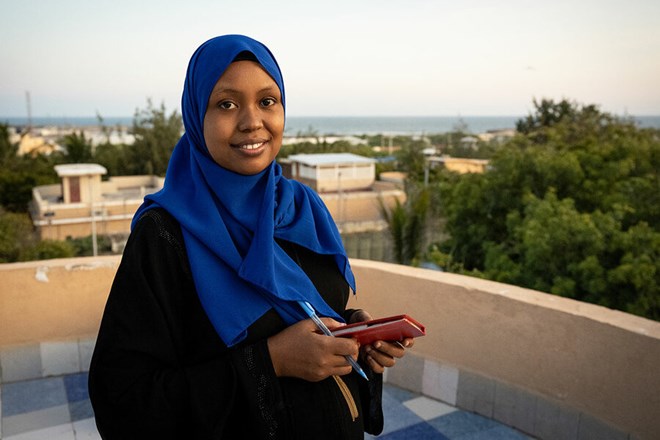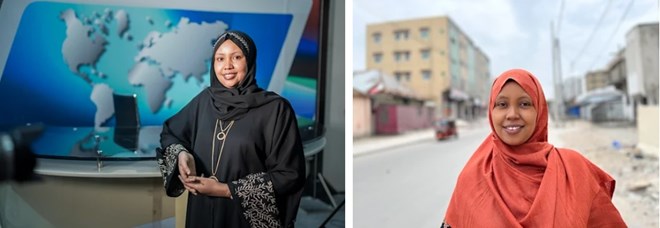Can one woman with a phone and a laptop change society?

Source: UNDP, Monday March 13, 2023
The Chief Editor of Somalia’s only all-women media team believes she can by using mobile journalism to break down barriers and open up new ground for women in the media

Scott Peterson/Getty Images/The CSM
As chief editor of “Bilan”, Somalia’s first all-women, editorially independent media unit, Fathi Mohamed Ahmed has been blazing a trail for women since the unit started up with support from UNDP almost a year ago. Boasting a string of articles in international media – including the Guardian, BBC and El Pais – and a huge following locally, Fathi and her team have shown how women can compete at the highest level of international journalism and bring new stories to public attention inside Somalia
They’re also showcasing a new approach to media production – using mobile journalism and the latest tech to get the job done faster, cheaper and more efficiently.
“Since the inception of Bilan Media, a year ago, we have been using advanced tools and software that have made our journalism work in Somalia easier, relying on smartphones, Mac computers, and digital audio tools for filming, editing and recording interviews,” Fathi says. “In this day and age, you don’t need huge analog cameras or an editing suite: you can get the job done on a phone and a laptop, editing as you travel, posting to social media from the road and cutting down on costs in the process.”
Digital tools and smaller tech also allow Bilan’s journalists to work more safely. In Somalia, many people still believe that journalism is a shameful profession for women and women journalists can face harassment on the street.

Fathi Mohamed Ahmed, Chief editor of Bilan Media
“The use of smaller media equipment allows us to do our work without standing out too much as journalists in places where that can be dangerous. Most people are used to male reporters carrying huge equipment, like big cameras and tripods, with one reporter and other man to carry to equipment, but now one woman can do all of that with a smartphone, gimbal, and wireless mics, Fathi says. “Mobile journalism – and women journalists – are the future of media.”
Apart from the media work, Mogadishu-born Fathi is a mother of three children, including one born just three months ago, and her days start long before she reaches the office.
“When I wake up in the morning, I prepare breakfast for my children, clean the house, drop the kids off at school then head to work,” Fathi explains. “Sometimes I go to work with my three-month-old son.”
This would be impossible in any other media environment, but at Dalsan TV, the media company that has partnered with UNDP to host the Bilan offices and distributes their reports locally, the Bilan team enjoys secure offices where women can work safely, without harassment and with the facilities they need to juggle the multiple commitments faced by working mothers.
In just a few months, the results have been dramatic. “With my team, I have produced a range of stories that never used to get attention in Somalia, including elderly people living with HIV, drug addiction among young women, female farmers studying agriculture degrees, and many more,” says Fathi “We want to be a voice for the voiceless.”
The United Nations Development Programme (UNDP) established Bilan Media in April 2022. Staffed and run entirely by women, Bilan produces high-quality, high-impact, original journalism across all platforms, including television and radio, for distribution across Somalia and also undertakes commissions for international media.
